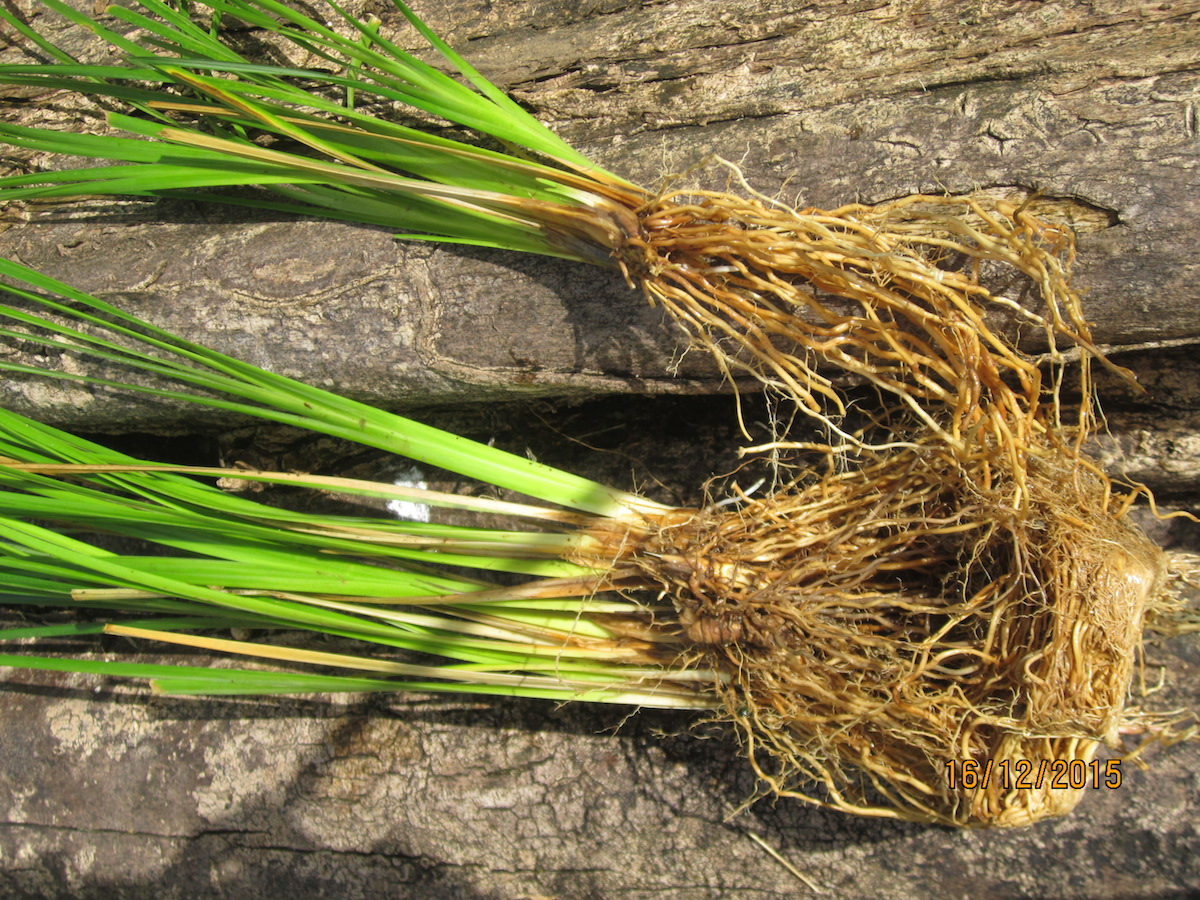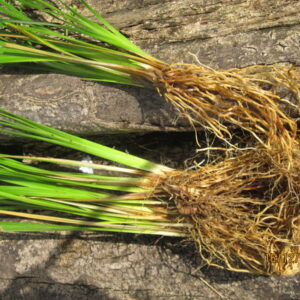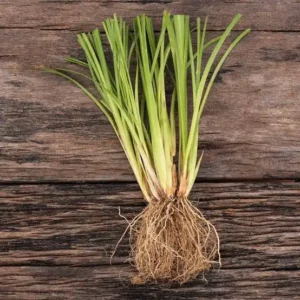No products in the cart.
Vetiver (Chrysopogon zizanioides), also known as khus or khas-khas, is a perennial bunchgrass native to India. This remarkable plant is characterized by its extensive and deep root system, which can grow several meters down, unlike most grasses that have shallow, spreading roots. This unique root structure gives vetiver exceptional properties that are beneficial in various applications.
There are two main types of vetiver: a fertile wild type that can produce seeds and a sterile cultivated type (like the ‘Sunshine’ cultivar) that is propagated vegetatively. The sterile type is preferred for many applications, especially outside its native range, to mitigate any potential invasiveness.
Vetiver thrives in tropical and subtropical climates and is known for its resilience, tolerating a wide range of soil conditions, including heavy metals and pollutants. It can withstand drought, floods, and fire, making it a hardy and adaptable plant.
Uses of Vetiver:
Vetiver’s unique properties have led to its diverse applications across various sectors:
Environmental Uses:
- Soil and Water Conservation: This is one of the most significant uses of vetiver. Its deep, dense root system binds the soil effectively, preventing soil erosion caused by wind and water. It is widely used to stabilize slopes, embankments (like railway cuttings), terraces, and riverbanks.
- Water Quality Improvement: Vetiver roots can filter and purify water by trapping sediment and absorbing pollutants, including heavy metals, nitrates, phosphates, and some agricultural chemicals. It’s used in constructed wetlands and wastewater treatment systems.
- Land Rehabilitation: Vetiver is effective in the bioengineering of degraded lands, mining sites, and other environmentally compromised areas due to its adaptability and ability to improve soil fertility.
- Runoff Mitigation and Water Conservation: The dense growth of vetiver hedges slows down surface water runoff, increasing infiltration and reducing water loss. Vetiver mulch also helps conserve soil moisture.
Agricultural Uses:
- Crop Protection: Vetiver can be used as a living barrier or hedge to protect fields from pests. For example, it attracts stem borers, which lay eggs on it, but the larvae cannot thrive, thus reducing infestation in nearby crops.
- Weed Control: Vetiver mulch forms a thick mat that suppresses weed growth in plantations like coffee, cocoa, and tea.
- Animal Feed: In some regions, vetiver leaves are used as fodder for livestock.
Aromatic and Medicinal Uses:
- Essential Oil Production: The aromatic roots of vetiver are steam-distilled to produce vetiver essential oil, a highly valued ingredient in the perfume industry (used in about 90% of Western perfumes, including Chanel No. 5) and aromatherapy. The oil has a distinct earthy, woody, and grounding aroma.
- Aromatherapy: Vetiver oil is used to promote relaxation, reduce stress and anxiety, improve sleep, and enhance mental clarity.
- Traditional Medicine: In Ayurveda and traditional medicine, vetiver has been used for its cooling and detoxifying properties, to treat skin conditions, reduce fever, improve digestion, and alleviate pain.
- Insect Repellent: The roots and essential oil have insect-repelling properties and are traditionally used to keep away moths and other insects from clothes.
Other Uses:
- Handicrafts: The fragrant roots are woven into mats, baskets, fans (especially in India and the Philippines), and screens that release a pleasant aroma, especially when dampened.
- Flavoring: Vetiver oil is used as a flavoring agent in some alcoholic beverages and food products.
- Cosmetics and Toiletries: The essential oil is used in soaps, creams, lotions, and deodorants for its fragrance and potential skin benefits.
Advantages of Vetiver:
- Excellent Soil Erosion Control: Its deep, strong root system is highly effective in binding soil and preventing erosion.
- Water Conservation: It reduces runoff and increases water infiltration, conserving soil moisture.
- Water Purification: It can filter pollutants and improve water quality.
- Resilience: It is tolerant to a wide range of soil conditions, heavy metals, drought, floods, and fire.
- Low Maintenance: Once established, it requires minimal care.
- Cost-Effective: It is a relatively inexpensive and sustainable solution for many environmental and agricultural challenges.
- Multiple Uses: It provides a variety of valuable products and services, from environmental protection to essential oil and handicrafts.
- Non-Invasive (Sterile Varieties): The cultivated sterile varieties do not spread aggressively, mitigating the risk of becoming invasive.
- Carbon Sequestration: As it grows, it captures and stores carbon in its biomass and soil, contributing to climate change mitigation.
- Improves Soil Health: Its deep roots can break up compacted soil, improving aeration and nutrient absorption.
Disadvantages of Vetiver:
- Potential Invasiveness (Fertile Varieties): Fertile varieties can become invasive in new environments if not managed properly, although the risk is generally low, and sterile varieties are preferred in many regions.
- Slow Establishment: It can be slow to establish in very poor or degraded soils, requiring initial support.
- Cold Sensitivity: It is a tropical and subtropical grass and is not very tolerant to prolonged freezing temperatures.
- Limited Seed Production (Cultivated Varieties): Sterile varieties need to be propagated vegetatively (from tillers or root divisions), which can be labor-intensive for large-scale planting.
- Root Competition: While generally beneficial for soil stabilization, dense vetiver hedges might compete with nearby shallow-rooted crops for water and nutrients if not properly managed.
- Pest and Disease Susceptibility: Although generally resistant, vetiver can be susceptible to certain pests like root-knot nematodes and stem borers, and diseases like leaf blight under specific conditions.
- Essential Oil Yield: The yield of essential oil can vary depending on the variety, growing conditions, and extraction methods.
- Market Demand Variability: The market demand and price for vetiver essential oil can fluctuate.
In conclusion, Vetiver (Chrysopogon zizanioides) is a versatile and valuable plant with significant environmental, agricultural, aromatic, and other applications. While there are some potential disadvantages, particularly concerning the fertile varieties and establishment in harsh conditions, the numerous advantages of vetiver, especially the sterile cultivars, make it a sustainable and effective resource for addressing various global challenges, from soil erosion and water pollution to providing valuable natural products.





Reviews
There are no reviews yet.